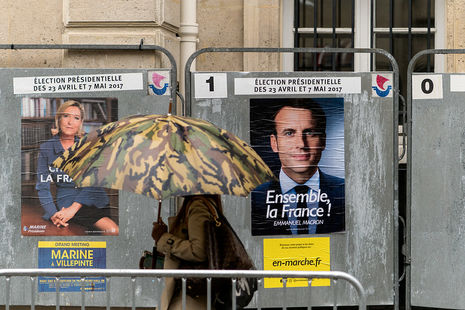France is showing the dangers of media concentration
With legislative elections around the corner, Juliette Fekkar argues that media concentration has enabled the rise of the French far-right

One of the biggest takeaways from last month’s Presidential election was the normalisation of the extreme right and record-high abstention rates in France. Whilst politicians should be held responsible for these trends, the media should not escape scrutiny.
Elections are often defined by crucial moments of media coverage and consumption. Who is not checking their phone for updates and scandals or watching the in-between round debates, despite having said they wouldn’t?
Over the course of the presidential campaign, French TV programs debated whether Marine Le Pen is, in fact, extreme right, casually interviewed her about her cats, and covered her family dinner, nicknaming her “miss good mood”. BFM-TV, the country’s most-watched news channel, dedicated almost half of its speaking time to Le Pen supporters before the official election monitoring started. Her candidacy has been deeply personalised and familiarised to voters; like ‘Boris’, many in France no longer know her as ‘Le Pen’, but as ‘Marine’. Given such coverage, is it any surprise that extreme-right parties got almost a third of first-round votes - an unprecedented level in the history of the Vth Republic?
“A phenomenon of banalisation and depoliticisation of the far-right”
Zemmour, another far-right candidate, gained fame and a platform through his controversial statements on TV. A product of media sensationalism, Zemmour’s rise is a prime example of the progressive shift of the media landscape and political discourse to the extreme right. His presence on TV sets has not stopped increasing since the late 2000s, scandal after scandal bringing in views. During the presidential campaign, he was everywhere. The scope of public debate was dictated by the themes he and Le Pen deemed relevant, and other candidates were reduced to commenting on his statements or constructing their narrative in relation to him.
The phenomenon of banalisation and depoliticisation of the far-right has been openly criticised since the early 2010s by independent journalists and political analysts. Has the omnipresence of the extreme right in the media normalised its presence in the political field? The results of the presidential election speak for themselves.
Due to the overrepresentation of the far-right, ecological and social issues were largely ignored during the campaign. Despite the fact that the last IPCC report gave politicians only three years to act decisively, climate change was not a main campaign issue. More than ninety per cent of the French electorate believed that issues of climate should have been a central campaign feature, yet the Presidential Debate allocated it under twenty minutes out of nearly three hours, with much valuable time instead oriented around immigration.
“Concentrations of power and influence threatens media independence and press freedoms”
This year’s elections demonstrate a long-term trend of media outlets failing to uphold necessary standards of objectivity and fair coverage. This issue was addressed by a Senate Investigation Commission that opened in November 2021, led by senators from the Socialist Party. The investigation targeted media concentration in France and its effects.
Whose subjectivity are we massively consuming?
Today, nine billionaires share the majority of the French press. Levels of media concentration have not only reached new heights, but power has also shifted from wealthy editors to international tycoons, who can use their influence to protect economic interests. One man, Vincent Bolloré, heads several television channels (Canal+, C8, CNews), publishing houses (Editis), newspapers (Prisma Media magazines, JDD, Paris Match) and a radio station (Europe 1). Such concentrations of power and influence threatens media independence and press freedoms. Several investigations have illustrated Bolloré’s desire to influence editorial lines; the senate report writes that, “journalists who make up the newsrooms have guarantees of independence, but are they sufficiently effective in the face of shareholders who might be tempted to intervene?”.
If there is still freedom of the press in France, it is not unreasonable to fear the progressive disappearance of editorial independence.
As the French legislative elections rapidly approach, it is time that mainstream political journalism stopped speculating, juggling with popularity surveys and polls — commenting on elections as one would for a horse race. It’s time the media did better. We need them to do better.
 News / Cambridge academics sign open letter criticising research funding changes22 February 2026
News / Cambridge academics sign open letter criticising research funding changes22 February 2026 News / Supporters protest potential vet school closure22 February 2026
News / Supporters protest potential vet school closure22 February 2026 News / Student and union protesters hold ‘Trans Liberation Solidarity Rally’ 24 February 2026
News / Student and union protesters hold ‘Trans Liberation Solidarity Rally’ 24 February 2026 News / Union speakers condemn ‘hateful’ Katie Hopkins speech14 February 2026
News / Union speakers condemn ‘hateful’ Katie Hopkins speech14 February 2026 News / Hundreds of Cambridge academics demand vote on fate of vet course20 February 2026
News / Hundreds of Cambridge academics demand vote on fate of vet course20 February 2026










